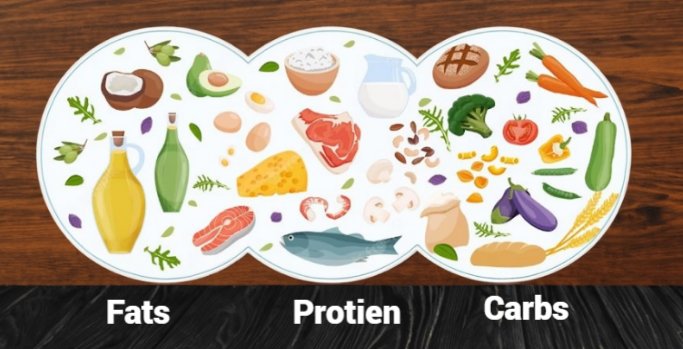Managing Your Diet for Better Health and Fitness . A Guide to Nutritional Management
This guide provides excellent nutritional methods along with tips for controlling your diet for increased health and fitness.

A proper diet is essential for achieving peak health and fitness. Food has a significant impact on our total well-being, influencing not just our physical health but also our energy levels, mental clarity, and capacity to achieve our fitness objectives. In this blog post, we'll look at the importance of nutrition in achieving health and fitness objectives, as well as present a detailed approach to nutritional management.
Nutrition is the basis on which our health and fitness goals are constructed. It has an immediate effect on our energy levels, body composition, strength, endurance, and recuperation. Nutrients have an important role in maintaining body functioning, muscle growth, and repair, and they even contribute to mental health. We may use nutrition to improve our health and attain our fitness objectives if we grasp its significance.
In this blog post, we'll look at nutritional management, which is making informed meal choices and implementing techniques to maximize the influence on our health and fitness. We will investigate the importance of nutritional management in achieving our fitness objectives, the connection between diet and health, and the role of macronutrients and micronutrients in our general well-being. In addition, we will offer practical advice on creating a balanced food plan, overcoming obstacles, and developing sustainable lifestyle habits. Our goal is to provide you with the knowledge and tools you need to effectively manage your diet for improved health and fitness.
By emphasizing the importance of nutrition and introducing the focus of the blog post on nutritional management, readers will understand the significance of this topic and be prepared to dive into the specific details and guidance provided throughout the blog post.
Understanding Nutritional Management
Proper nutrition is essential for maintaining good health and avoiding chronic disorders. Nutritional management ensures that we get enough macronutrients (carbohydrates, proteins, and fats) and micronutrients (vitamins and minerals) to support our bodily processes and well-being. We can treat any vitamin deficiencies by actively regulating our diet. inadequacies, improve overall health outcomes, and maintain organ function.
Diet and health have a complex and profound relationship. Our food has a direct impact on our physical and mental health, as well as our susceptibility to certain diseases. A well-balanced and nutrient-dense diet provides the body with the vitamins, minerals, antioxidants, and macronutrients it requires for proper functioning.
A poor diet, defined by an excess of processed foods, unhealthy fats, added sugars, and a lack of nutrient-dense foods, can raise the risk of chronic illnesses such as obesity, heart disease, type 2 diabetes, and some malignancies. A nutritious and well-balanced diet, on the other hand, promotes a robust immune system, aids in weight management, boosts energy levels, and improves mental clarity., as well as overall well-being.
Nutritional management is critical to achieving our fitness goals. When we exercise, our bodies require sufficient nutrition to perform optimally, recover effectively, and adjust to training stimuli. Nutritional management ensures that we get the proper nutrients to our bodies at the right times to support muscle growth, repair, and recovery.
We may optimize our energy levels, endurance, and strength, and obtain the desired body composition by regulating our nutrition. Understanding the importance of macronutrients, such as carbs for energy, proteins for muscle repair, and fats for overall health, is essential for nutritional management. It also requires taking into account nutrient timing, hydration, and recovery nutrition to maximize fitness performance and recuperation. Help with post-workout recuperation.
To summarise, understanding dietary management is critical for achieving our health and fitness objectives. It enables us to make informed dietary choices, rectify nutrient deficiencies, and improve our general well-being. Recognizing the link between diet and health and harnessing the potential of nutritional supplements We may make big strides towards our fitness goals and sustaining a healthy lifestyle with proper management

Evaluating Your Nutritional Requirements
Understanding your calorie needs is critical for good nutrition management. Age, gender, exercise level, and goals are all important factors in estimating your daily calorie needs. You can estimate your basal metabolic rate (BMR) and total daily energy expenditure (TDEE) by using internet calculators, talking with a certified nutritionist, or using formulas such as the Harris-Benedict equation. This formula can be used to help you plan your calorie consumption and achieve your health and fitness objectives.
Macronutrients (carbohydrates, proteins, and lipids) are necessary for proper nutrition. Understanding your macronutrient requirements is critical for optimizing your diet. Carbohydrates offer energy for physical activity, proteins are required for muscle repair and growth, and fats help with a variety of biological activities. While individual needs vary, a basic rule of thumb is to ingest 45-65% of your daily calories from carbohydrates, 10-35% from proteins, and 20%-35% from fats. Changing these percentages based on your objectives, tastes, and health concerns might help you customize your macronutrient consumption to your specific needs.
Micronutrients, such as vitamins and minerals, are essential for good health and well-being. They serve an important role in a variety of body functions, including immunological function, bone health, and cellular processes. Including a wide range of nutrient-dense foods in your diet assists in ensuring proper intake of vital micronutrients. Vitamins and minerals are abundant in fruits, vegetables, whole grains, lean meats, and dairy products. Understanding the importance of micronutrients allows you to make informed decisions to improve your overall nutrition and health.
In conclusion, understanding your nutritional needs is an important step in nutritional management. You may develop a firm basis for efficient diet management by assessing your calorie requirements based on age, gender, activity level, and goals, evaluating macronutrient needs for balanced nutrition, and recognizing the relevance of micronutrients. This knowledge enables you to adapt your food intake to meet your health and fitness objectives, ensuring that your body receives the fuel and nutrients it requires for optimal performance and well-being.

Designing a Well-balanced Meal Plan
It is critical to include a range of whole foods when creating a balanced meal plan. Whole foods are high in important nutrients, fiber, and antioxidants, such as fruits, vegetables, whole grains, lean meats, and healthy fats. These foods provide a variety of vitamins, minerals, and phytochemicals that promote good nutrition and general health. To guarantee a broad nutrient intake, add a variety of colors, textures, and flavors to your meals.
Portion control is essential for sticking to a healthy eating plan. Be cautious of portion sizes to avoid overeating and to ensure that you are getting enough of each food category. Use visual clues to regulate your portion amounts, such as smaller plates or measuring cups. Furthermore, mindful eating practices like eating deliberately, savoring each bite, and paying attention to hunger and fullness cues can help prevent overeating and build a healthier relationship with food.
Aim to balance macronutrients in each meal to optimize your food plan. To offer sustained energy and enhance satiety, combine carbohydrates, proteins, and lipids. Carbohydrates give immediate energy, whereas proteins and lipids slow digestion and keep you satiated for longer. Including a source of each macronutrient in your meals, such as whole grains, lean proteins, and healthy fats, can aid in the creation of a balanced diet. well-rounded and pleasurable eating experience.
Planning your meals and snacks ahead of time is an efficient method for sticking to a balanced diet and avoiding unhealthy choices. Make a weekly meal plan and grocery list to ensure you have a range of nutritious meals easily available. To save time on hectic days, prepare meals and snacks ahead of time, such as by batch cooking. When hunger strikes, having healthy options on hand lowers the temptation to go for processed or unhealthy foods.
In summary, creating a balanced meal plan entails combining a range of complete foods for best nutrition, practicing portion control and mindful eating, and balancing macronutrients in each meal for optimal not maintaining energy and satiety, as well as preparing meals and snacks ahead of time to prevent making poor choices. You may build a meal plan that supports your health and fitness objectives, provides nourishment, and assists you in making thoughtful and nutritious choices throughout the day by applying these ideas.
The Role of Macronutrients in Nutritional Management
Carbohydrates:
Carbohydrates are the body's main source of energy. Understanding the various forms of carbs might help you manage your nutritional intake more successfully. Complex carbs, found in meals such as whole grains, legumes, and vegetables, provide a constant release of energy and enhance feelings of fullness. Simple carbs, which are found in sugary foods and refined grains, provide rapid energy but can cause blood sugar rises and falls. Including a variety of complex and simple carbohydrates in your diet will help you maintain consistent energy levels throughout the day.
Focus on consuming a majority of your carbohydrates from a variety of sources. Whole grains like brown rice, quinoa, and whole wheat bread are great options. These carbs are high in fiber, which delays digestion and ensures a consistent release of glucose into the bloodstream. Combining complex carbohydrates with a source of protein or healthy fat can improve energy release over time.
Proteins :
Proteins are required for muscle development, healing, and maintenance. Micro-tears in muscle fibers occur during physical exercise, requiring protein to mend and develop stronger. Adequate protein intake promotes muscle repair and synthesis, resulting in increased muscular strength and recovery. Furthermore, proteins are involved in a variety of biological processes, such as enzyme manufacturing and hormone regulation. as well as immune system assistance.
Incorporating lean protein sources into your diet is critical for nutritional management. Poultry, fish, lean cuts of meat, eggs, dairy products, legumes, tofu, and plant-based protein sources like quinoa and tempeh are all excellent sources. Protein intake recommendations vary depending on age, gender, exercise level, and goals. Aim for 0.8-1 gram of protein per kilogram of body weight as a general guideline. Athletes and others who engage in strenuous activity, on the other hand, may require a larger protein intake to support their training and recovery.
Fats:
Fats are an important part of a healthy diet, but it's critical to grasp the distinction between healthy and unhealthy fats. Avocados, almonds, seeds, fatty fish, and olive oil include healthy fats such as monounsaturated fats and polyunsaturated fats. These fats provide several health benefits, including improved heart health, brain function, and inflammation reduction. Saturated and trans fats, for example, are frequent in processed foods, fried dishes, and fatty meats. It is critical to limit your intake of harmful fats for your general health
Essential fatty acids, such as omega-3 and omega-6, are essential for good health. The body cannot generate these lipids, thus they must be received through diet. Fatty fish (salmon, mackerel, sardines), flaxseeds, chia seeds, and walnuts are high in omega-3 fatty acids. Vegetable oils, nuts, and seeds are good sources of omega-6 fatty acids. Incorporating these important fatty acids into your diet benefits brain function, heart health, and inflammation reduction.
To summarise, understanding the role of macronutrients in nutritional control is critical for diet optimization. A well-rounded nutritional plan includes balancing complex and simple carbohydrates for sustained energy, incorporating lean sources of protein for muscle growth and repair, and distinguishing between healthy and unhealthy fats while incorporating essential fatty acids. You can support your health, fitness objectives, and overall well-being by effectively regulating your macronutrient consumption.

Nutritional Management and Micronutrients
Micronutrients, such as vitamins and minerals, are essential for good health and supporting numerous biological activities. Immune function, energy production, cell growth and repair, bone health, and cognitive function are all affected by them. Micronutrient deficiencies can cause a variety of health problems and jeopardize general well-being. It is critical to include a range of nutrient-dense foods in your diet to ensure a sufficient intake of these essential vitamins and minerals.
A balanced diet is crucial for meeting your micronutrient needs. Here are some foods that are high in important vitamins and minerals:
- Vitamin A is found in carrots, sweet potatoes, spinach, and eggs are all options.
- vitamins B are abundant in whole grains, legumes, nuts, seeds, lean meats, and dairy products
- Vitamin C is abundant in citrus fruits, berries, bell peppers, and leafy greens.
- Vitamin D sources include fatty fish, fortified dairy products, and sun exposure.
- Vitamin E is abundant in nuts, seeds, vegetable oils, and leafy greens.
- Calcium-rich foods include dairy, leafy greens, fortified plant-based milk, and almonds
- Zinc-rich foods include seafood, lean meats, legumes, and seeds
Incorporating a range of these nutrient-dense foods into your diet helps to ensure that you are getting enough vitamins and minerals.
While a well-balanced diet should meet the majority of your nutritional requirements, certain circumstances may necessitate the use of supplements. Individuals, for example, with supplementation may be beneficial for people with special dietary restrictions, limited food options, or certain health issues. Before beginning any supplements, contact a healthcare practitioner or certified nutritionist to confirm they are appropriate for your unique needs. Supplements should be used to supplement a balanced diet rather than to replace whole meals.
When it comes to supplements, it's crucial to remember that they should be used sparingly and according to individual needs. Supplementation is not necessary for everyone, and excessive intake of some vitamins and minerals might be harmful. A personalized approach supervised by a healthcare practitioner ensures that any supplements you take are suitable for your nutritional requirements.
In conclusion, micronutrients, such as vitamins and minerals, are critical for general health. well-being. It is critical for nutritional management to obtain these nutrients through a balanced diet that includes a variety of nutrient-dense foods. You may support your body's micronutrient needs and optimize your health and wellness by integrating food sources rich in important vitamins and minerals and considering supplements when necessary.

Nutritional Management Strategies for Success
Meal planning and preparation can significantly help in successful nutritional management. By setting up time to prepare meals and snacks in advance, you can ensure that you have healthful options on hand even on the busiest of days. To save time, plan your meals for the week, make a shopping list, and batch-cook ingredients. Meals should be portioned into containers so that you can readily grab a balanced meal whenever hunger strikes. This technique encourages consistency, decreases dependency on unhealthy convenience meals, and assists you in meeting your nutritional objectives.
Mindful eating is essential for optimal nutritional management. Mindful eating entails being present. You must be present and conscious of your dining experience. Pay attention to hunger and fullness cues, savor your food's flavors and textures, and eat slowly. This enables you to better evaluate your satiety and avoid overeating. Also, be aware of emotional eating triggers and create alternative coping methods to address emotional needs other than food. Deep breathing, journaling, or seeking support from loved ones can all help you manage your emotions efficiently.
Seeking professional advice from certified dietitians or nutritionists can be extremely advantageous when it comes to nutritional management. These nutrition specialists have extensive knowledge and can provide personalized advice based on your individual needs, goals, and health problems. They can assist you in creating a customized meal plan, addressing nutrient shortages, navigating dietary limitations, and providing continuous support and accountability. Working with professionals guarantees that you get correct information and guidance throughout your nutritional journey.
Maintaining motivation and keeping track of your progress is critical for long-term nutritional management success. Consider keeping a food journal or tracking your meals, snacks, and overall nutritional patterns with a smartphone app. This allows you to become more conscious of your eating habits, discover areas for change, and celebrate your accomplishments. Tracking your progress can also help you keep accountable to your goals while also serving as a source of encouragement and inspiration.
In summary, successful dietary management tactics are critical to accomplishing your health and fitness goals. You can build sustainable habits and maintain a balanced approach to nutrition by incorporating meal prep and planning, practicing mindful eating, obtaining professional help when needed, and keeping motivated through tracking progress. These tactics can help you take control of your diet, improve your general health, and set yourself up for long-term success in nutrition management.

Addressing Challenges and Overcoming Obstacles
Cravings might be difficult to control when it comes to eating a balanced diet. Try the following ways to combat cravings and make healthier choices:
Determine the cause: Recognise what causes your desires, whether it's stress, boredom, or specific food cues.
Look for healthier alternatives: Look for healthy substitutes that will fulfill your cravings. For example, instead of a sugary dessert, consider a piece of dark chocolate or baked sweet potato fries instead of deep-fried ones.
Exercise portion control: Allow yourself a modest quantity of anything decadent and savor it thoughtfully if you're desiring it. This can help you satisfy your craving without jeopardizing your diet. Divert your focus away from cravings by engaging in activities or hobbies. Take a stroll, call a friend, or do something else that makes you happy that is not tied to food.
Social interactions and eating out can put your nutritional management goals in jeopardy. Here are some ideas for dealing with these situations while still eating healthy:
Make a plan: Check the menu ahead of time to locate healthier options. If feasible, recommend establishments that provide a variety of nutritional options.
Exercise portion control: Consider sharing a dish or opting for a lesser portion if you are concerned about portion proportions. To keep your consumption under control, request dressings and sauces on the side. Make the following substitutions: Request changes to your dish, such as swapping fries for a side salad or selecting grilled alternatives for fried ones.
Concentrate on balance: A balanced plate should include veggies, lean proteins, and complete grains. To increase your nutrient intake, fill half of your plate with vegetables.
Be assertive and express your needs: Don't be scared to request changes or explain your dietary preferences to your server. Most eateries are friendly and eager to meet your needs.
Setbacks are an unavoidable part of every journey, including those involving nutritional management. Here's how to deal with setbacks while remaining committed:
Adopt a growth mindset: Consider setbacks to be opportunities for learning and growth. Consider the elements that contributed to the setback and devise ways to avoid such circumstances in the future.
Self-compassion means being kind to yourself and avoiding self-judgment. Recognize that failures come to everyone and utilize them to motivate you to get back on track.
Review your objectives: Remind yourself of why you began your nutritional management journey. Reaffirm your dedication to your health and well-being by refocusing on your goals.
Seek help: Speak with friends, relatives, or a support group for encouragement and accountability. Consider hiring a qualified dietitian or nutritionist to provide direction and keep you on track.
Celebrate small victories: Recognise and appreciate your accomplishments, no matter how minor very positive move you take gets you closer to your long-term objectives.
In summary, addressing challenges and overcoming obstacles is a crucial part of successful nutritional management. By dealing with cravings and making healthier choices, managing social situations and dining out mindfully, and handling setbacks with resilience and support, you can stay committed to your nutritional goals and maintain a healthy and balanced lifestyle. Remember, progress is not always linear, and it's important to be patient and kind to yourself as you navigate your nutritional journey.

Conclusions
We have discussed the importance of nutritional management in gaining greater health and fitness throughout this blog article. We talked about the importance of nutrition in promoting general well-being, the connection between diet and health, and the role of macronutrients and micronutrients in our diet. We also advised on how to create a balanced meal plan, analyze caloric and macronutrient requirements, and incorporate necessary vitamins and minerals into our diet. We have underlined the importance of dietary management in fueling physical activity, supporting muscle growth and repair, optimizing energy levels, and improving overall health and wellness.
Now that you have a thorough understanding of nutritional management and a toolbox of tactics at your disposal, it's time to put them to use. Implementing these tactics will pave the path for long-term success and will assist you in reaching your health and fitness objectives. Remember to consume a variety of whole foods, practice portion management, and mindful eating, seek professional help when necessary, and stay motivated by documenting your progress. Face problems with resilience and determination, understanding that setbacks are inevitable. Accept the process and rejoice in the minor successes along the road.
You are adopting a proactive approach to your health and well-being by prioritizing dietary management. Remember that this is a lifelong endeavor in which consistency is essential. Continue to be committed, knowledgeable, and conscious of choices that support your health and fitness objectives. Your body and mind will thank you for making healthy adjustments.
Here's to a future of better health, increased fitness, and long-term well-being achieved via smart nutritional management. You now have the knowledge and skills you need to take control of your nutrition and live the bright life you deserve. Begin today and reap the benefits of a well-managed diet in your life.
I wish you the best of luck on your journey to better nutritional management!
What's Your Reaction?



















